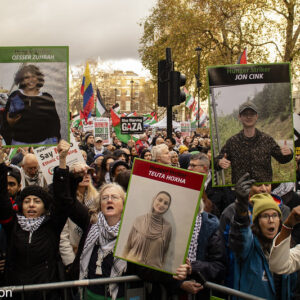What remains of the left inside the Labour Party is putting energies into supporting the few candidates who can be trusted, the Green Party will include some left candidates who may make a difference, there are socialist alliances to the left of Labour that are aiming to make a showing, and there are local attempts to put communist politics back on the agenda. This is a mess, and the question is how we can make the best of this divided left opposition during the election and build an ongoing challenge to a new Tory government or a Tory-lite Starmer regime.
First principles
However bad Starmer is, however efficiently he has filleted the Labour Party, through broken ‘pledges’, expulsion of activists and the parachuting in of apparatus-loyal candidates, the ousting of the Tories will make a significant difference to the conditions in which we struggle. Getting rid of the Tories will boost the confidence of those who have been battling for their livelihoods and rights, and, whether we like it or not, many will vote for and look to Labour as an alternative. Either that will be in desperation or include illusions that the party will change things; whatever, it will be a minimal step forward.
It is very likely the Labour Party will win the next general election, but that win will be a hollow victory if we are not ready to put demands on Starmer, and that means building an alternative well to the left of the Labour Party leadership now. For that, we will need to maintain links with the few remaining pockets of resistance to Starmer inside the Labour Party. It will not be good enough, however, to simply argue that we should ‘vote Labour with no illusions’, or imagine that we can pressure Starmer to shift to the left.
Whatever votes we deliberately choose to give to Labour candidates must be conditional; that is, we may vote for a local Labour Party activist who genuinely and openly challenges the Starmer agenda. If there is really no other candidate to the left, we will even so vote for the least worst candidate against the Tories. That does not mean voting for the Liberal Democrats, a party with a record of coalition and support for Tory cuts. It may, in some cases, mean voting for the SNP in Scotland or Plaid Cymru in Wales in order to put an end to the fiction that we live in a ‘United Kingdom’. So, our watchwords here will be ‘Vote Left of Starmer’ and ‘Build opposition to Tory and Tory-lite governments now’.
Alternatives
The valiant attempts to cobble together socialist alliances of the left in the election or to argue for communist politics as a tactic by standing local candidates will give us many opportunities to vote left of Starmer and build the opposition we need if the Labour Party is elected or, heaven forbid, the Tories get back in. Some of those ‘left’ alternatives will be less appealing than others, and some will include reactionary elements, but the overall message of a combined vote to the ‘left’ will be a message of strength of struggle, continuing and more confident struggle under a Starmer government.
There are risks, but we need to work our way through this in order to turn those risks – fragmented, isolated and unlikely bets on the possibility of a radical vote – into opportunities. There is the danger, of course, that some pretend ‘left’ candidates will pander to reactionary ideas to get votes, and there is a danger that some good revolutionary candidates will look like cranks, simply scooping up the random ticks on the ballot paper. Campaigns that are clear that the election is a mere tactic to get across propaganda will also risk looking like Jehovah Witnesses on the doorstep when they ask people to build communism in their communities now.
Nevertheless, the very visible existence of these alternatives will pose a challenge to the attempt by the Labour Party to treat this all as a done deal and to hope to turn silence about policy in the run-up to the election into a smooth transition into a business-as-usual administration with business-as-usual austerity and cuts to services. We cannot wish away the divisions on the left, and we need to be willing to acknowledge that, if there are 57 varieties of alternative, then, ok, the more the merrier, vote and build, turn the yearning for alternatives into combined action. So, our watchwords here will be ‘Combine the left alternatives after the election’ and ‘This election is about more than a vote’.
In struggle
An election opens a window in which people are, in however limited a way, willing to think about politics, and there is an openness to talk about alternatives that we need to be part of. That will mean, in some special cases, working in or alongside a ‘left’ candidate, but it must also mean supporting our comrades in other parts of the country who are pursuing this path through other means. Whether it means clear solidarity with one particular candidate or calling for a vote for them, it also means that revolutionaries must have their own arguments about what we are building and how to build it.
So, whatever canvassing or door-knocking we might get involved in, that means taking with us information about ongoing struggles and sources of support, whether that is about tenants unions or trades unions, asylum and anti-deportation networks or solidarity initiatives. Use this time to make the point that this is about more than voting and that we need to build on whatever opposition there is to the Tories to continue opposition and self-organisation after the election.
This must not all be focused on who gets into parliament, and there will be extra-parliamentary action that is crucial now, during the election and after it. An election and the casting of a vote is small part of the process of building different forms of anti-capitalist resistance. So, our watchwords here are ‘Two, three, many alternatives to the Tories’ and ‘Elections are not enough to change the world’.
Art (54) Book Review (127) Books (114) Capitalism (68) China (81) Climate Emergency (99) Conservative Government (90) Conservative Party (45) COVID-19 (46) EcoSocialism (60) Elections (83) Europe (46) Fascism (62) Film (48) Film Review (68) France (72) Gaza (62) Imperialism (101) Israel (129) Italy (46) Keir Starmer (56) Labour Party (113) Long Read (42) Marxism (49) Marxist Theory (47) Palestine (182) pandemic (78) Protest (153) Russia (343) Solidarity (150) Statement (50) Trade Unionism (144) Ukraine (351) United States of America (139) War (370)
Latest Articles
- Iran: Campism and the Erasure of TheocracyNew forms of campism are undermining internationalism. Simon Pearson discusses.
- Labour in office – the way forward for the left in BritainReflecting on Labour and the British left, Alan Thornett discusses the situation.
- Crude CapitalismTony Richardson reviews Crude Capitalism by Adam Hanieh Verso Books 2024
- Queerness and neurodiversity in FrierenFrieren: Beyond Journey’s End is available on Crunchyroll. Echo Fortune reviews.
- Palestine hunger strikes paused: It was love, not hate, that called me‘I want to make it abundantly clear that this is not about dying, because unlike the enemy, I love life, and my love for life, for people, is the reason why I have been incarcerated.’ ’These are the words of Heba Muraisi, the longest running hunger striker in Britain since the 1980s explains Caterina Teodoroiu.







This is not the agreed ACR position, but was written by me as an opening to a discussion in ACR. My name was left off in error.
A thoughtful and much needed article.
I appreciate that this is a discussion article and not the position of ACR on the forthcoming general election but there are four problems with the article in my view:
1) left sects, such as TUSC (really a ‘flag of convenience’ for the Taaffe Socialist Party), Galloway’s WPB and others, who are standing in the General election are problematic, as they don’t in general represent a ‘left alternative’ at present to mass parties and there may be problems with their programme including a world view based around ‘campism’ such as calls for disarmament of Ukraine (and thereby the victory of Russia). I am opposed to general calls for “voting left” when those on the left do not represent an alternative. On the other hand there may be the odd opportunity in England for a positive alternative to official Labour and obviously Corbyn is one such issue
2) There’s no discussion on whether a Green vote is a viable option (eg Sian Berry in Brighton?). The Greens in England & Wales (GPEW) are tainted by their deal with LibDems in 2010 and are moving rightwards. Some of their prominent members are actively transphobic and there’s a general tendency to present themselves as “the” Green Party, an appalling stance to take towards devolution and national questions. There will actually be three Green Parties standing in the UK general election. The Scottish Green Party are a separate party from the Green Party in England & Wales and well to the left of GPEW and to Labour, SNP and Plaid; but SGP are also part of a de facto governmental coalition (“agreement”) with the SNP in Scotland.
3) It’s up to left in Scotland to determine best tactics there; however those in England have to recognise that the anti-democratic unionism of Labour and the devolved parliament/government for many issues such as NHS, education, transport etc pose totally different circumstances and tactics. Additionally only a vote for the SNP can get rid of the 6 Tory MPs and 4 LibDems – “vote Labour get Tory” is actual reality in those constituencies. But the SNP while being left of Starmer’s Labour on many issues are also a party of government. But the election is actually for a different body; so it’s quite complex how far ‘reserved issues’, such as indyref2, nuclear weapons, Ukraine etc, prevail over ‘devolved issues’, like NHS, education, housing that will be a feature of London-centric media coverage. Scotland (& Wales) vote on devolved issues separately in May 2026. Marxists need to be clear about the increasingly asymmetric nature of Disunited Kingdom politics now, its not just an issue about growing separatist/independentist tendency, under existing devolution – politics on most issues is quite different!
4) While marxists can and should propagandise around the big debates that dominate bourgeois and left media, in terms of impact there is also a need to focus. In 2017 and 2019 I feel there was a downplaying by all those involved in Labour’s left over nuclear weapons and Labour’s support, even under Corbyn, for Trident replacement. Given the consequences of Ukraine’s unilateral nuclear disarmament in 1994 resulted in a Russian invasion, I don’t think the question of British nuclear weapons and UN power politics around nuclear non-proliferation (ie retaining nuclear monopoly by 5 Security Council members including the UK state) should be ignored again. However the position of CND in supporting the implicitly anti-Ukraine/pro-Russia ‘Stop the War’ (sic) coalition means that there is probably a need to run an independent left wing campaign around the need to rid the UK state of nuclear weapons.